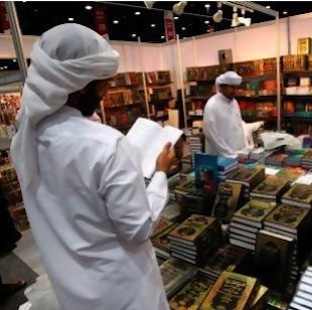By: Summer Yasmin
There is something magical about the weight of a book in your hands. The feel, sound and scent of printed pages have a type of euphoria that cold, hard technology, despite its conveniences, cannot rival. South Asia, a place of tradition, still upholds its love and respect for print literature. Amongst the regions often unpredictable social, political and economic conditions a softer side emerges; words are still highly prized and celebrated here. Perhaps it is because freedom of speech is not readily available that makes it’s expression so very coveted. Perhaps it is the way in which thousands of people choose to protest the struggles of their daily lives.
One way in which South Asians are keeping their literary tradition alive is through book fairs and literature festivals. These festivals are not mundane, stuffy affairs. They live up to their festive countenance by proving to be mental, emotional and spiritual raves! If you have the pleasure of attending one, you will laugh, cry, reminisce, hope and dream all in one breath. This vibe could be felt at the Jaipur literature festival in India in January where crowds came out to hear the Dalai Lama speak on opening day. India itself hosts 30 literature festivals annually with hundreds of thousands of attendees. Publishers attribute the popularity of book fairs in India to the county’s middle class, which is growing both in numbers and literacy. Bangladesh, Nepal, Bhutan and Pakistan have also caught the book fair craze.
This past month Pakistan launched its 27th Lahore international book fair. With the country struggling to stay afloat amongst continuing violence and unrest, emotions were high at this year’s fair where poets, authors and spoken word artists wove inspiration and hope into the air. Zehra Nigah, 76 year old feminist poet, gave society a good rattling with her poems Mai bachgayi maa (mother, I survived) where she expresses the plight of female feticide victims and Huddod in which she gives voice to the young, blind women Safia Bibi, a victim of rape who was prosecuted for her pregnancy. Her elegant yet bold resistance against injustice was applauded by young and old alike, bringing tears to the poet’s eyes.
“Why should women remain behind men in the poetic journey of life? Why not walk together when our destination is the same?”
Although Karachi has also had literary festivals, Lahore brought a unique essence to the event. The city itself has a character very reflective of Pakistan’s literary tradition. The combination of Mughal and British Colonial architecture has for centuries, provoked creative minds. This sentiment was reiterated by founder and CEO of the festival, Razi Ahmed. Acclaimed novelist Bapsi Sidhwa (of Cracking India fame) remarked about Lahore “If I toss up the word and close my eyes, it conjures up gardens and fragrances” She was welcomed by the city with equal warmth. Author, Mohsin Hamid was another famous voice amongst those to grace the festival this year. Hamid is known for his novels “Moth Smoke” , “The Reluctant Fundamentalist” and “How to get Filthy Rich in Rising South Asia.” Hamid’s simple statement “This lets Lahore see what Lahore is” brought home the message of resilience and hope.
The presence of international writers, journalists and publishers added a global element to the book fair. British historian, William Dalrymple, former BBC journalist Mohammed Hanif and British Pakistani writer Tariq Ali joined local authors to “honor Lahore. “ 350 stalls representing publishers from Pakistan, India, the UK, USA and Turkey and displaying books on every topic imaginable, delighted fair goers and participants.
Along with South Asia, another notable book fair hub is alive and kicking in the Middle East. Dubai, known as “festival city” hosted the Emirates Airline festival of literature during the first week of March. It showcased everything from Science fiction writers to children’s book illustrators. This year’s festival was also the platform for Oxford University’s press story writing competition and Taaleem poetry competition. Over in Sharjah, U.A.E, the Sharjah children’s reading festival and Sharjah world book fair will be running through May, 2013. Attendees can enjoy programs not only in literature but also art, cuisine, publishing, and entertainment.
Book fairs continue to be enormously popular in South Asia and the Middle East. Not only are these regions culturally traditional and seek to combat the dwindling existence of print media, they also use book fairs as a way to address social issues and exhibit a softer side of their country. Although the Lahore book fair had a whimsical touch to it, Pakistan’s writers became the voice of the common man during many of the discussions ignited during the gathering of progressive minds. It became a platform to face the countries crumbling educational infrastructure with issues such as equal access to education, censorship and trans border relations being major points of discourse. “There are still many kids in Pakistan who will never see the inside of a school” said Mohsin Hamid, acknowledging the need for the literary community to reach out to the marginalized. Similarly, the Sharjah book fair is known as a historical outlet for lost Arabic literature. Many hidden or forgotten literary gems can be found amongst its displays. People frequent the event in the hopes of having a unique intellectual experience and finding something new. But it’s not just about books, Sarjah also hosts forums on technology, social media and education. Book fairs in general play a multifaceted role in these nations; they keep literary traditions alive and at the same time develop the future of international literature.




















I know everything is about digital media these days, but there is nothing like holding a book in your hand